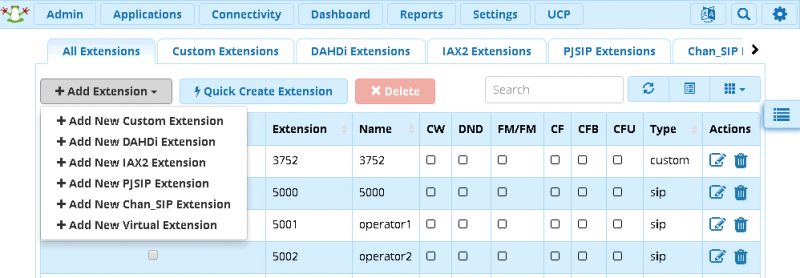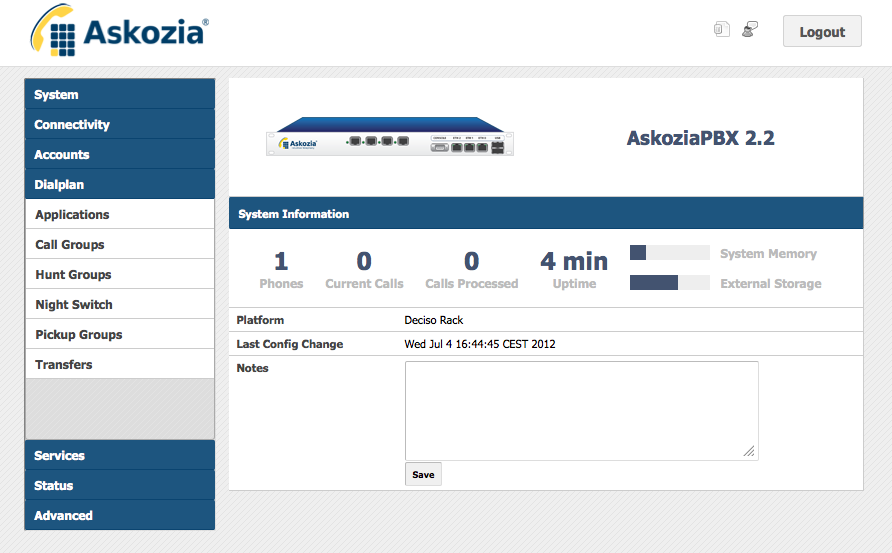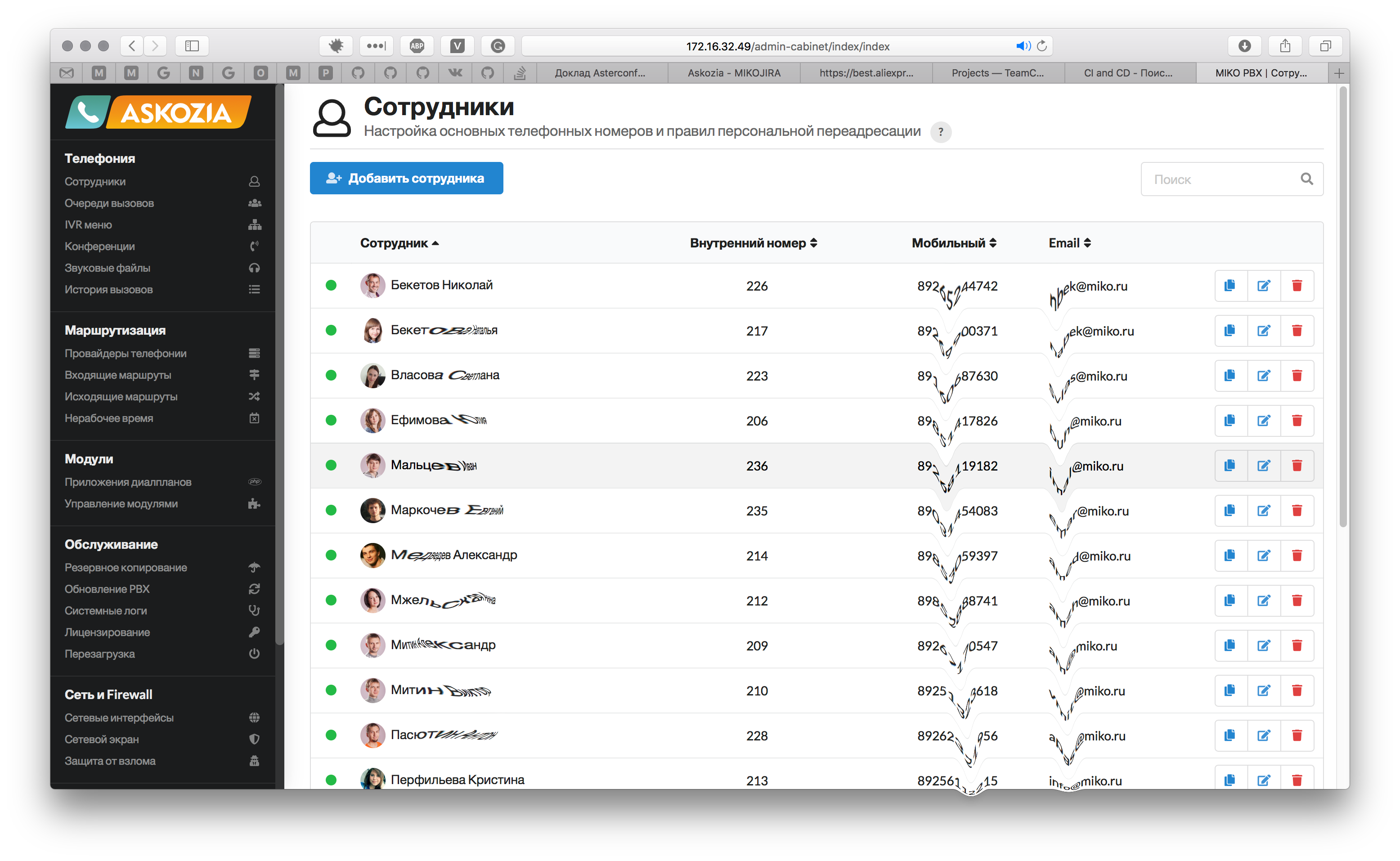How we reinvented Askozia IP PBX after the project was sold and closed by the developer
How beautiful it was until hour X
We are a small development team, which many years ago was engaged in the development and implementation of 1C programs. Back in 2011, we knew 1C software products well, and did not have experience in developing our own solutions. At that time, the company was 5 years old and engaged in the classic 1C business a little tired, needed a breath of fresh air. And we plunged into the world of IP telephony, and specifically in the jungle of Asterisk. This is an awesome platform, with its own language for writing dialplans. Somewhere we already saw it, platform + configurations, everything is like in 1C :)
One of the most popular configurations for Asterisk at that time was, and now, FreePBX remains free. In fact, this is a web muzzle written in PHP, which brings all the settings of Asterisk into a “convenient” web interface. You do not need to know anything about the Asterisk dialplan team, everything happens under the hood.
We installed this monster for ourselves, and made our first successful product, the module for integrating 1C and Asterisk programs. It was a mixture of C ++ code in the form of a DLL and 1C code for embedding in 1C.
The product entered the market well, but the developers, they are technical support guys, and I just moaned from the number of applications for setting up FreePBX, one of them. We constantly twisted something, finalized, changed almost every our client. On the one hand, we had constantly changing 1C configurations, and on the other, FreePBX, which had a bunch of different versions, branches, and also an automatic update module.

We again began to slide down to the service model, instead of developing a circulation product, we did customization.
We really needed the PBX build we controlled on Asterisk, so that we could cover everything with tests and guarantee the operability of our products, at least with something specific.
At some point, we found the Askozia project, from the German company Plantel. It was a free PBX with a small but sufficient functionality for most of our customers. We were finally able to assemble a ready-made boxed solution that fully worked after installation exactly the way we wanted it to.

Over time, Askozia acquired new features: a route editor in the form of visual block diagrams, support for automatic configuration of phones, secure calls, various hardware boards and gateways. It bothered us a bit ... The product became paid , and the support of some foreign providers and foreign standards of analog-digital communication channels was generally unnecessary for us.
But, despite all this, the product entered the market and sold well, we bought the Askozia.ru domain, made a website, and were engaged in marketing and distribution.
Hour X
In August 2017, I was on vacation and was delighted with a call with the news: “Askozia was purchased by 3CX.”

At first I did not understand the extent of the problem. Well, sometimes someone buys something. Of course, it was sad to find out that the guys with whom we had been working side by side for 5 years sent each other gifts for the new year in the form of bottles of alcohol, became part of a large company. Probably, we will no longer have such warm relations.
But after a couple of weeks, we got even more fun news: “The Askozia PBX project is closing, sales are possible until the end of 2017, support until the end of 2018, we are switching to 3CX.”
The phrase flies through my head: “Great, but how are we?” We have a website, marketing, deeply integrated developments, an established work scheme, partners whom we trained in setting up Askozia and our 1C integrations ... Everything went down the drain!
What to do?
I didn’t want to return to FreePBX, all the bumps that we had not yet healed. Askozia was taken from us and they will certainly not sell or develop it. 3CX is a cool platform, but it is not on Asterisk, and we need to redo a lot to work with it. Not an option, because we now have many clients on FreePBX and Askozia, and even there are desperate guys with pure Asterisk, we need to continue to develop our solutions.
And let's do our Askozia
It's just a web-interface that writes dialplans. Yes, in a couple of months we’ll sketch a prototype, and in half a year we’ll do MVP (which is not a shame to show people). We know Asterisk like the back of our hand, we know that Askozia was built on the t2sde platform (this is about a small embedded Linux).
There was excitement, but there was a catastrophic lack of time. In order to win it at least a little, we got the opportunity from Plantel guys to purchase the current versions of Askozia for the future, so that we had enough until mid-2018.
1 year passed
We really were able to assemble the prototype in 3 months, and 5 months after the start of development, we replaced Plantel's Askozia in our office with our own. But these were only the first 90% of the project :)
The very first release we released in September 2018 (a year later). Our Askozia is built on the same t2sde platform, in the heart of it is Asterisk, the PHP framework Phalcon is responsible for the web interface and internal API, and we chose the Semantic-UI style set as the web muzzle design.
Outwardly it turned out pretty, internally structured.

At least it seems so to us!
Unlike developments in 1C, for us, Askozia is a completely independent product written from 0 and built on our own customized operating system. During development, we learned a bunch of useful tools: Jira, Bitbucket, Team City, Katalon Studio, SonarQube and all sorts of recommendations for structuring and writing code, its design, automatic assembly and testing.
And let's throw a call to FreePBX
This idea came to me during the long New Year holidays. I like FreePBX for its functionality, a huge number of options, because it has been tested on hundreds of thousands of installations. It is completely free. Anyone can download it, deploy it, and make IP telephony for their company.
But he has a big minus. It has too many options, it is not so easy to configure if you are doing this for the first time. It’s difficult to integrate with him, because It is constantly updated, the version of Asterisk is changing, which adds new options for the administrator and dubious additional business opportunities.
It's like a microwave, in which there is both a grill and a multi-cooker, and a bunch of all sorts of programs, but really 99% of users press one button.
We decided to reinvent the idea of the guys from Plantel and create a simple telephone system for small companies that need basic IP telephony functions. Most importantly, it must be installed very quickly, configured without unnecessary instructions and be free .
Why is Askozia needed if there are cloud providers
This is of course a matter of choice. I don’t like vendorlocks, I don’t like it when the provider will have the opportunity to listen to all our conversations, even internal ones. I do not like to pay a monthly fee for every gigabyte of storing conversation records and for each additionally connected someone else's number, for the API for integration into CRM or for each employee.
Cloud providers are comfortable buses that go where most people need, and their own PBX is a personal car that goes exactly where you need it. The choice is yours :) Despite the large number of cloud providers, Asterisk and FreePBX have a huge number of users, which means I have like-minded people!
How to make money if Askozia is a free telephone exchange
This question is regularly asked to me especially by colleagues. Some twist at the temple. Have you spent a year and a half of life developing a product and give it away for free? Yes, that's exactly it!
I studied the number of Askozia requests in Google search results from the moment of its appearance on the market, and it very actively added exactly until it was made a commercial product, after that interest began to fade. This is a shame, because The idea and the project seemed very interesting to me. Let him live! Let's see what happens after years.
The plans are to make the English version, and to wind the tail of FreePBX, at least in the place where one button on the microwave is enough to warm the sausage :) And after that we’ll think about monetization, paid modules and all that.
Do you think it will fly?
